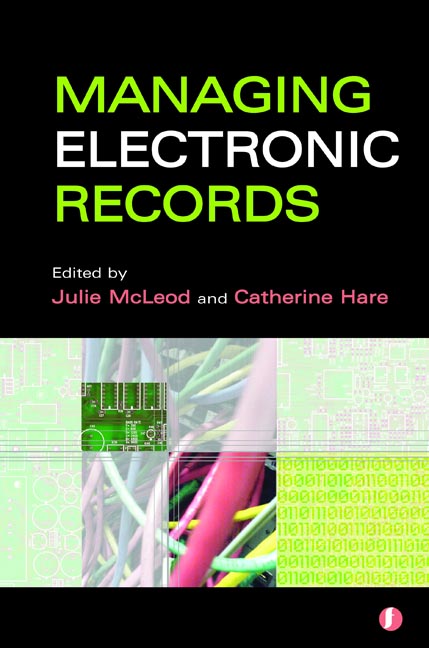Book contents
- Frontmatter
- Contents
- The editors and contributors
- Preface
- 1 The wild frontier ten years on
- 2 The use of standards and models
- 3 Metadata matters
- 4 Digital preservation – ‘the beautiful promise’
- 5 Research in electronic records management
- 6 Technologies for preservation
- 7 Legal issues
- 8 Ethics and electronic recordmaking
- 9 Competencies – the asset that counts most: on developing human talents as a prerequisite for successful EDRM changes
- 10 Records management: two case studies from the French private sector
- 11 Implementing a solution for electronic recordkeeping in the public sector
- 12 Playing the long game – creating and maintaining the links in the value chain
- Index
3 - Metadata matters
Published online by Cambridge University Press: 08 June 2018
- Frontmatter
- Contents
- The editors and contributors
- Preface
- 1 The wild frontier ten years on
- 2 The use of standards and models
- 3 Metadata matters
- 4 Digital preservation – ‘the beautiful promise’
- 5 Research in electronic records management
- 6 Technologies for preservation
- 7 Legal issues
- 8 Ethics and electronic recordmaking
- 9 Competencies – the asset that counts most: on developing human talents as a prerequisite for successful EDRM changes
- 10 Records management: two case studies from the French private sector
- 11 Implementing a solution for electronic recordkeeping in the public sector
- 12 Playing the long game – creating and maintaining the links in the value chain
- Index
Summary
Introduction
The word metadata is a difficult and obtuse one, but when the IT and the terminology are stripped away metadata in a records management context is essentially data that describes, contextualizes and facilitates the management of records. Good metadata enables good records management but, seen more broadly, the effective application of metadata can help the achievement of more extensive objectives, such as better information accessibility, maintenance of corporate memory and greater accountability in business operations.
Metadata is therefore a critical tool in any contemporary business environment. In the majority of business environments, however, metadata that contributes to records management objectives is either poorly implemented or not applied at all. To help determine how better to implement metadata in an organization, this chapter examines what metadata is in a records management context and focuses on a range of practical strategies to help guide metadata implementation.
Metadata in a records management context
Applied appropriately, the role of metadata in a records management context is to:
• identify records, the people or workgroups that create and use them and the areas of business they document
• establish connections between related records, between records and the people or workgroups that create and use them, between records and the business they document and between people and the business they perform
• help manage and preserve record content, structure and accessibility
• administer management requirements, including terms and conditions of access, use and disposal
• document actions performed upon records and their metadata
• facilitate the discovery, understanding and retrieval of records.
The application of metadata also enables a significant range of broader business objectives to be achieved. These include increased control, understanding, authenticity, security and accessibility of organizational information and the ability to reuse data as required. The ability to increase access and use of organizational information securely is an incredibly valuable commodity in today's business environment and is a key benefit that effective metadata implementation can facilitate.
There are many other types of metadata that differ in their scope and application from records management metadata. Prominent examples of metadata schema created by other communities to serve specific purposes include the Dublin Core standard, created to facilitate cross-domain information resource description (Dublin Core Metadata Initiative, 2004), and Standard Generalized Markup Language (SGML), a form of structural metadata used to break a document into its component parts to facilitate its mark-up and flexible, electronic representation.
- Type
- Chapter
- Information
- Managing Electronic Records , pp. 34 - 49Publisher: FacetPrint publication year: 2005



